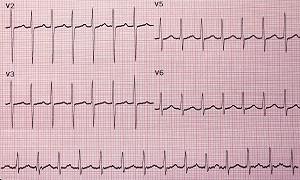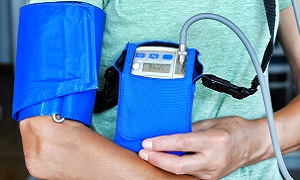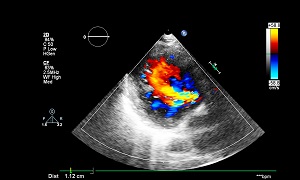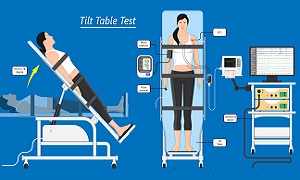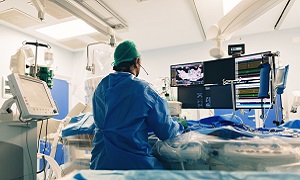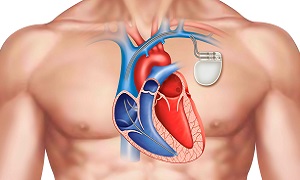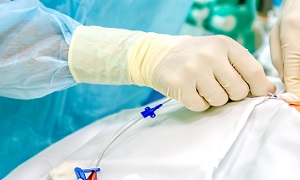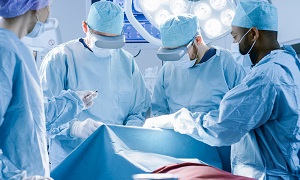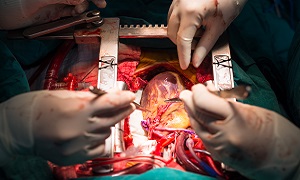Best Doctors in India for Arrhythmia Treatment
Best Hospitals in India for Arrhythmia Treatment
Paras Hospital, Gurugram
- City: Gurugram, India
Hospital Highlights:
- Paras hospital was established in 2006 and is the 250 bedded flagship hospital of Paras Healthcare.
- The is supported by a team of doctors of international and national repute.
- The hospital is NABH accredited and also the first hospital in the region to have a NABL accredited laboratory.
- The hospital provides specialty medical services in around 55 departments including Neurosciences, Joint Replacement, Mother & Child Care, Minimal Invasive Surgery, Gynecology and Obstetrics, Ophthalmology, Dermatology, Endocrinology, Rheumatology, Cosmetic and Plastic surgery.
- The hospital is equipped with state-of-the-art technologies.
S L Raheja Hospital, Mahim, Mumbai
- City: Mumbai, India
Hospital Highlights:
- SL Raheja hospital is a 140-bed multi-specialty tertiary care hospital that is being managed by Fortis Healthcare Ltd.
- The hospital is a benchmark in healthcare and medical facilities in the neighborhood of Mahim & the western suburbs.
- L.Raheja Hospital, Mahim has one of the most effective ICU and Casualty care services.
- The hospital provides specialty medical services in Cardiology, Oncology, Neurology, Orthopedics, Mother & Child Care, and in Diabetes.
Wockhardt Hospitals, Mumbai
- City: Mumbai, India
Hospital Highlights:
- Wockhardt Hospitals were established in the year 1973, originally called First Hospitals and Heart Institute.
- Wockhardt Hospitals are super specialty health care networks in India, nurtured by Wockhardt Ltd, India’s 5th largest Pharmaceutical and Healthcare company.
- Wockhardt Hospitals is associated with Partners Harvard Medical International, an international arm of Harvard Medical School, USA.
- Wockhardt Heart Hospital performed India’s first endoscopic heart surgery.
- The hospital has a state-of-the-art infrastructure equipped with the latest technologies and modern equipment.
- It has special Centers of Excellence dedicated to the major specialties to provide hassle-free and high-quality clinical care.
Pushpawati Singhania Hospital & Research Institute, New Delhi
- City: New Delhi, India
Hospital Highlights:
- Established in 1996, Pushpawati Singhania Research Institute is one of the top hospitals in the NCR region, as well as one of the top facilities in India for gastroenterology. The hospital is one of South Asia’s first institutes in medical and surgical treatment for diseases related to digestion.
- The hospital is equipped with state-of-the art facilities coupled with the latest equipment as well as renowned consultants from various parts of India as well as other parts of the world.
W Pratiksha Hospital, Gurgaon
- City: Gurugram, India
Hospital Highlights:
- W Pratiksha Hospital, Gurugram, is one of the best hospitals in the NCR region. It is also a top hospital in India for IVF. Since its inception, the hospital has performed over 5500 successful IVFs. The hospital also specializes in gynecology.
- With over 20 years of experience in providing quality healthcare, the hospital is known as one of the most trusted and valued health providers in India.
- Equipped with world-class medical facilities and advanced technology, the hospital’s doctors and clinicians also have a track record of delivering excellent results. The hospital is also known for focusing on preventive well-being as much as on curative treatment.
- The hospital has earned the trust of its patients, by providing the best available treatments at affordable costs.
Narayana Superspeciality Hospital, Gurugram
- City: Gurugram, India
Hospital Highlights:
- Situated near DLF Cyber City, Gurugram, Narayana Superspecialty Hospital is one of the top medical facilities in the Delhi NCR region, catering to the needs of the people. Known for its commitment to quality medical care and patient service, the hospital is a state-of-the-art facility with planned and well-equipped sections, which includes a spacious OPD area as well as comfortable patient rooms.
- It is the closest super-specialty hospital from Indira Gandhi International Airport towards Gurugram, and also the nearest super specialty hospital from DLF Cyber City. It is also close to major residential areas in Gurugram.
- It is part of the renowned Narayana Health Group. Established in 2000, by Dr. Devi Shetty, a renowned cardiac surgeon, it has grown to be one fo India’s leading healthcare groups.
Sir Ganga Ram Hospital, New Delhi
- City: New Delhi, India
Hospital Highlights:
- Sir Ganga Ram Hospital, New Delhi is known to provide the latest medical procedures with the latest technology in all of its units.
- The hospital has a team of reputed doctors, nurses, and healthcare professionals that ensure that patients receive quality care at affordable costs.
- Staffed with a team of highly qualified doctors, dedicated nurses, and paramedical and non-medical staff, the hospital aims to lead in healthcare delivery, medical education, training, and research.
- As per the vision of the founder, the hospital also provides free treatment to the economically weaker sections of society.
- Sir Ganga Ram Hospital also provides training to young doctors under the Diplomate in National Board(DNB) program. The DNB program at the hospital was started in 1984 and it is known for currently running the maximum number of DNB specialties in the country. It also has the distinction of having the first bone bank in India.
KIMS Hospital, Hyderabad
- City: Hyderabad, India
Hospital Highlights:
- KIMS Hospital (a brand name of Krishna Institute of Medical Sciences) is one of the largest and best multi-speciality hospitals in Hyderabad. The hospital provides various treatments to an enormous number of patients.
- The hospital has a capacity of more than 3000 beds. KIMS Hospitals offers different healthcare services in more than 25 specialities and super specialities.
- The hospital is equipped with modern medical equipment and technology. It has robotic equipment to provide minimal invasive techniques for patients.
- The hospital is aimed at providing world-class healthcare facilities and services at an affordable cost for patients.
- The various specialities and departments of the hospital include neurosciences, gastroenterology & hepatology, robotic science, reproductive sciences, dental science, oncological sciences, organ transplantation, heart and lung transplantation and mother and child care.
Fortis Hospital, Shalimar Bagh
- City: New Delhi, India
Hospital Highlights:
- Fortis Hospital in Shalimar Bagh is a multi-super specialty hospital that strives to provide world-class patient care by leaving no stone unturned.
- Fortis, Shalimar Bagh, with 262 beds and a 7.34-acre footprint, provides the best level of medical care through its team of doctors, nurses, technicians, and management professionals.
Reliance Hospital, Mumbai
- City: Mumbai, India
Hospital Highlights:
- Reliance Hospital is one of the best super-specialty care hospitals in Navi Mumbai.
- The main purpose of this hospital is to become a trustworthy place for the best health and hope for society. The hospital is well connected to the suburbs of Mumbai and Navi Mumbai.
- The hospital has various specialty departments, viz., Accident & Emergency, Anesthesiology, Dental Services, Dermatology, Diabetology, Dietetics Nutrition, Endocrinology, ENT, Gastroenterology, General Surgery, Gynaecology And Obstetrics, Hepato Pancreato Biliary Surgery, Infectious Disease, Internal Medicine, Interventional Radiology, Laboratory Medicine, Minimal Access Laparoscopic Surgery, Nephrology, Neurosciences, Opthalmology, Orthopaedics, Paediatrics, Pain Management Palliative Care, Physical Medicine Rehabilitation, Plastic And Reconstructive Surgery, Psychiatry, Pulmonary Medicine, Radiology, Rheumatology, Transplant, Urology Andrology, Vascular Surgery
ARRHYTHMIA
Arrhythmia is a condition of irregular heartbeat, where a person’s heart may beat too fast, too slowly or with an irregular rhythm. This problem occurs when the electrical signals that coordinate heartbeats don’t work properly. An irregular heartbeat might feel like a racing heart. Sometimes, doctors use the word ‘dysrhythmia’ to describe this condition, but the words ‘dysrhythmia’ and ‘arrhythmia’ actually means the same.
Many heart arrhythmias are harmless. However, if they become highly irregular or result from a weak or damaged heart, it can cause severe and potentially fatal symptoms as well as complications.
Types of Arrhythmia
There are different categories of arrhythmia, which includes:
- Bradycardia, a slow heartbeat
- Tachycardia, a fast heartbeat
- Irregular heartbeat also called flutter or fibrillation
- Early heartbeat, also called as a premature contraction
The majority of arrhythmias are not severe and they don’t cause complications. However, there are some, which can increase the risk of stroke or cardiac arrest.
Symptoms of Arrhythmia
Arrhythmias might not cause any signs or symptoms. It is usually found by your doctor while having a routine examination. It is also important to note that having a few signs and symptoms doesn’t necessarily mean that your condition is serious.
Some of the noticeable symptoms of arrhythmia include:
- A fluttering in your chest
- A slow heartbeat
- Chest pain
- Shortness of breathe
- A racing heartbeat
- Fatigue
- Anxiety
- Sweating
- Fainting
- Lightheadedness
If you are experiencing these problems on a regular basis, you might consider seeking urgent medical care. Ventricular fibrillation is a type of arrhythmia that can be deadly. It occurs when your heart beats with rapid, erratic and electrical impulses. This can cause the lower chambers of your heart to quiver uselessly instead of pumping blood. Without a proper and effective heartbeat, blood pressure plummets and it cuts off blood supply to the vital organs.
A person suffering from ventricular fibrillation can collapse within a few seconds and soon won’t be breathing or having a pulse. If this happens, you need to call the emergency number in your area. If you find no one who is trained in cardiopulmonary resuscitation, try to provide hands-only CPR. Also, see if an automated external defibrillator is available nearby. They might be available in several places, such as airplanes, police cars or shopping malls.
Causes of Arrhythmia
Several causes leading to arrhythmia is there, such as
- Alcohol abuse
- Diabetes
- Drinking a lot of coffee
- High Blood Pressure
- Hyperthyroidism
- Stress
- Scarring of the heart, often due to a heart attack
- Substance abuse
- Certain medications or supplements
- Smoking
- Structural changes in the heart
A person having a healthy heart won’t ever experience long-term arrhythmia, unless they receive an external trigger, such as an electrical shock.
Diagnosis of Arrhythmia
For diagnosis of a heart arrhythmia your doctor will review your symptoms as well as your medical history, after which a physical examination will be conducted. Your doctor might ask you about conditions that can trigger your arrhythmia, such as heart disease or a problem with the thyroid gland. Your doctor might also perform heart-monitoring tests specific to arrhythmias. These can include:
Electrocardiogram
Holter monitor
Event recorder
Echocardiogram
Implantable loop recorder
Stress test
Tilt Table Test
Your doctor might recommend tilt table test if you’ve had fainting spells. Your heart rate and blood pressure are monitored as you lie flat on the doctor’s table. Then the table is tilted as if you were standing up. This can help your doctor observe how your heart and the nervous system which controls it respond to the change in angle.
Electrophysiological testing and mapping
Treatment options for Arrhythmia
Treating slow heartbeats
If slow heartbeats don’t have a cause that can be corrected, then doctors usually treat them with a pacemaker because there are no medications that are known to reliably speed up the heart.
Pacemaker is a small device that is usually implanted near your collarbone. Multiple electrode-tipped wires run from the device through your blood vessels to the inner portion of your heart. If your heart rate is too slow or if it stops, the pacemaker will be sending out electrical impulses which will be stimulating your heart to beat at a steady rate.
Treating fast heartbeats
Vagal maneuvers
It is possible to stop arrhythmia which begins above the lower half of the heart with the use of particular maneuvers which can include holding your breath and straining or dunking your face in ice water or coughing.
Your nervous system is affected by these maneuvers. Therefore this method can control your heartbeat and often causes your heart rate to slow. However, this technique doesn’t work for all kinds of arrhythmia.
Medications
For various types of tachycardia, your doctor will prescribe you medication to control your heart rate or restoring a normal heart rhythm. It is quite important to take any anti-arrhythmic medication as your doctor has directed. If you are having atrial fibrillation, your doctor might prescribe blood-thinning medications to help in keeping dangerous blood clots from forming.
Cardioversion
If you are having a certain type of arrhythmia like atrial fibrillation, your doctor might use cardioversion which can be conducted as a procedure or through medications.
Catheter ablation
During catheter ablation, your doctor threads one or more catheters through the blood vessels to your heart. Electrodes that are at the catheter tips can use heat, extreme cold or even radiofrequency energy to damage a small spot of heart tissue. It will then create an electrical block along the pathway that’s causing your arrhythmia.
Sometimes a pacemaker or defibrillator can also be implanted to help in treating heart arrhythmias. When a pacemaker detects an abnormal heart rate, it will emit electrical impulses which can stimulate the heart to beat at a normal rate. A defibrillator can also detect abnormal heart rhythm and send out low or high-energy shocks for resetting the heart to a normal rhythm. However, this device will not be able to prevent the abnormal rhythm from occurring.
Surgery
Surgery is also recommended in some cases for treating heart arrhythmias:
Maze procedure
In maze procedure, a surgeon will make a series of surgical incisions in your heart tissue in the upper half of the heart. Since scar tissue will not conduct electricity, it will interfere with stray electrical impulses that can cause some types of arrhythmia.
Though this procedure is effective, it is only reserved for the people who have not responded well to other treatments.
Coronary bypass surgery
Lifestyle changes
Prevention of Arrhythmia
In order to prevent heart arrhythmia, living a healthy lifestyle is quite important to reduce the risk of a heart ailment. A heart-healthy lifestyle can include:
- Eating a diet healthy for your heart
- Staying active physically and maintaining your weight
- Avoiding smoking or inhaling smoke
- Limiting the use of caffeine and alcohol
- Reducing stress, because intense stress and anger can lead to problems in the rhythm of the heart
- Using over-the-counter medications, with caution, as some cold and cough medications contain stimulants which can trigger a rapid heartbeat.











